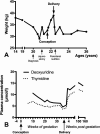Pregnancy in MNGIE: a clinical and metabolic honeymoon
- PMID: 33159497
- PMCID: PMC7732247
- DOI: 10.1002/acn3.51202
Pregnancy in MNGIE: a clinical and metabolic honeymoon
Abstract
Mitochondrial neurogastrointestinal encephalomyopathy (MNGIE) is an inherited disease caused by a deficiency in thymidine phosphorylase and characterized by elevated systemic deoxyribonucleotides and gastrointestinal (GI) and neurological manifestations. We report the clinical and biochemical manifestations that were evaluated in a single patient before, during, and after pregnancy, over a period of 7 years. GI symptoms significantly improved, and plasma deoxyribonucleotide concentrations decreased during pregnancy. Within days after delivery, the patient's digestive symptoms recurred, coinciding with a rapid increase in plasma deoxyribonucleotide concentrations. We hypothesize that the clinico-metabolic improvements could be attributed to the enzyme replacement action of the placental thymidine phosphorylase.
© 2020 The Authors. Annals of Clinical and Translational Neurology published by Wiley Periodicals LLC on behalf of American Neurological Association.
Conflict of interest statement
All the authors confirm that there is no conflict of interest to declare.
Figures
References
-
- Karaa A, Elsharkawi I, Clapp MA, Balcells C. Effects of mitochondrial disease/dysfunction on pregnancy: A retrospective study. Mitochondrion 2019;46:214–220. - PubMed
-
- Lara MC, Valentino ML, Torres‐Torronteras J, et al. Mitochondrial neurogastrointestinal encephalomyopathy (MNGIE): biochemical features and therapeutic approaches. Biosci Rep 2007;27:151–163. - PubMed
Publication types
MeSH terms
Grants and funding
LinkOut - more resources
Full Text Sources
Medical


